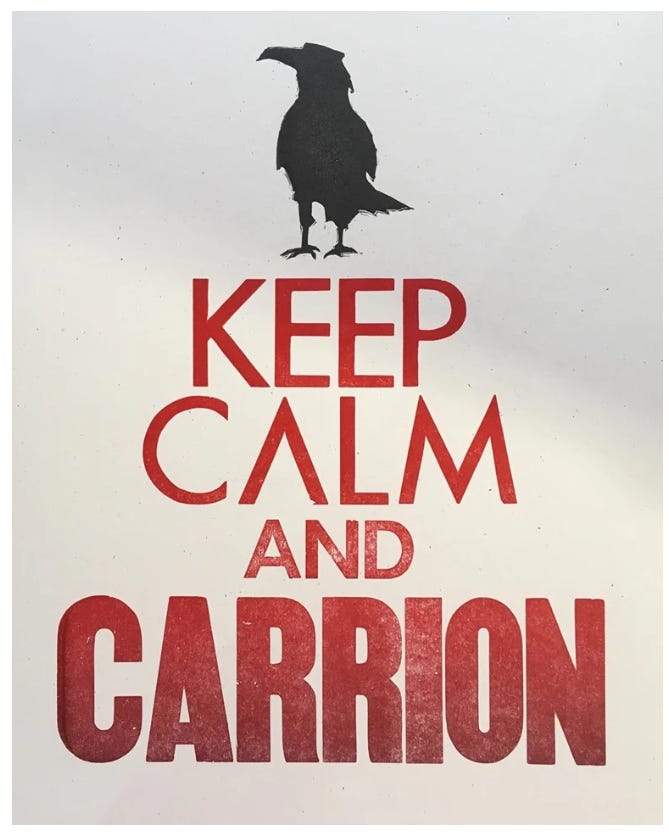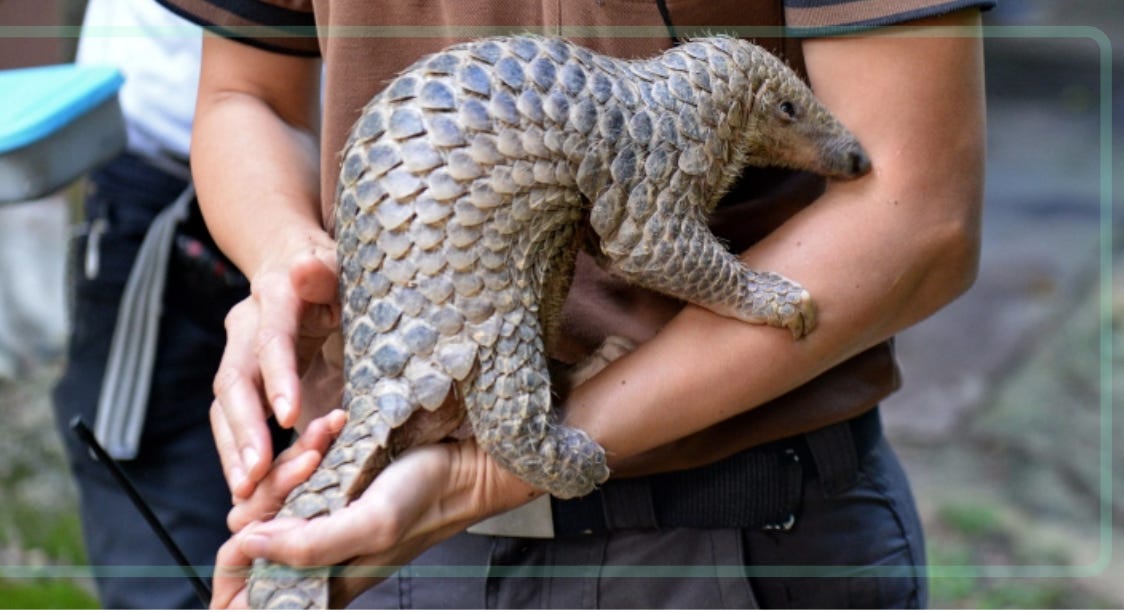Keep Calm & Carrion
I never saw that coming. One of the hardest things to manage in system design is anticipating the tipping points and unintended consequences.
Unintended Consequences — Humans generally do not interact with nature. Instead, we intervene and manipulate it. What could go wrong?

Are You Gonna Eat That?
I heard an interesting story on RadioLab about the unintended consequences of human behavior in the food chain. When we are kids we seem to gravitate to “a favorite animal”. Not many go for the vulture!”
Vultures Get a Bad Rap
Being a vulture is not cool I guess. There are lots of birds that behave similarly to the vulture and we don’t disparage them. Birds that can eat dead and even rotting meat are important. Anyone who has watched a crime show knows we send out experts who look at a corpse and based on the kind of bugs around, it is pretty easy to predict the time of death. As soon as we stop ticking, the decay begins. The rest of the food chain like bacteria, and worms have to eat. Vultures have evolved to be able to eat rotting flesh and not get sick. It is mostly because they have strong stomach acid compared to other animals, upwards of 100X as strong as mammal stomach acid. So before giving up on this story, embrace the idea there are birds built for “the cleanup on aisle five” function. Check out this article if you want to learn more. If you are bored with it, bald eagles, hawks, and crows are all AMAZING BIRDS that also happen to have this stomach acid superpower.
What the heck is an NSAID?
Step two of this story is a wonder drug we cannot live without! There are lots of trade names for Non-Steroidal Anti-Inflammatory Drugs (NSAIDs) like ibuprofen, naproxen (like Naprosyn), and diclofenac (such as Voltaren). These are wonder drugs but too much can have serious side effects, especially for our kidneys in humans. That’s why when we have a lot of pain, we might alternate between Tylenol (acetaminophen) and an NSAID. I have now reached my pharmaceutical knowledge limit.
What if the Vultures Disappeared?
A world without vultures, buzzards, and carrion birds, in general, would have terrible consequences for all of us. It is a cautionary tale about how dangerous the breakdown of the food chain can be. Lots of rotting meat, viruses, and illness transfer would be a drag for all of us. In the portion of my career adjacent to the industrial food system, it was SHOCKING how much we readily interchanged human medicines to animals we want to eat mostly because (1) we know how to make it (2) we can make them cheap and (3) the industrial scale of using it on animals improves the profitability of peddling it to humans. Two examples I know a lot about are:
antibiotics — when the newspaper, radio, or TV want to startle and scare us they recycle stories about “superbugs”. There is indeed a slow but rising number of instances of infections in hospitals that are immune to all of our antibiotics. The part of the story often glossed over is 2/3 of all antibiotics are being given to ANIMALS (other than humans). We eat them and probably are not as careful as we might be in the preparation process. Viruses, cancer, and antibiotic resistance are accelerated by the broad use of antibiotics in animals we eat.
Pepto-Bismol — that magic pink liquid we use when we have an upset stomach. If you are familiar, you know it is pretty thick, not runny. Functionally it lines your stomach and buffers the stuff in your stomach that has you uncomfortable. The part of the story I experienced is Proctor and Gamble sells Pepto-Bismol on the farm in much larger bottles than the ones we can buy at Walgreens.
Facts Versus Opinions
“I believe the most likely way to end up with unintended consequences is to create a clash between ancient thinking with modern thinking. I hope you revisit this quote after this section and like my premise.”
So the story on RadioLab is titled “Corpse Demon”. Here is a link to the story on YouTube (because Substack handles YouTube links nicely).
Humans created their earliest alphabet about 4000 years ago. About 3500 years ago, Zoroastrianism emerged as the first monotheistic belief system. Judaism, Christianity, and Islam would emerge later. I know the least about Zoroastrianism. The story on Radiolab takes form from the ancient practice preferred for the disposition of the dead. Zoroastrianism is practiced as a minority religion in India, Pakistan, and Afghanistan for example but originated in Persia. The Zoroastrian practice is to remove dead bodies to a central facility where vultures hover over and consume the bodies. No judgment here. The point is this is an ancient and traditional practice. The problem that blossomed was the process broke down when the vultures were disappearing. Ugh.
It turns out that Hindu culture includes the high status reserved for cows. This leads to lots of old cows. Since treating the animals humanely is a priority (not so much on a feedlot), the Indian government began allowing the use of one of those NSAIDs I listed previously called diclofenac. The problem was the vultures were mysteriously (and quickly) dying off. It turned out that when the vultures were feeding on these old-age cows full of diclofenac, the NSAIDs were KILLING the vultures!
The Rise of the Unintended Consequence
So I figure three things interacted in this little system diagram. I decided against drawing a causal loop diagram because I’m not good at drawing vultures, burning towers, and cattle.
Pharmaceutical experts stayed in their silo and just concluded an NSAID was a good solution for cattle arthritis since it worked well for us.
The kindness of Hindu practices to prioritize the comfort of their cows meant giving them more diclofenac to ease their inflammation.
The tradition of Zorastrians to follow their religious practices in how they process their dead had no reason to change.
Our world is complex. Mix these three practices and things rapidly went pear-shaped! Merging modern practices with centuries-old traditions is a recipe for unintended consequences.
The good news for this story ( if there is one) is that the vultures were reduced to very low numbers but are on a slow recovery. The Indian government (and others) have suspended the use of NSAIDs on their cattle. The Zoroastrians are examining their practices (not enough vultures) and considering new ways to process their dead bodies including cremation. This brings me to my conclusion.
There is NOTHING wrong with adhering to long-standing traditions. The tragedy is only if we assign special status to such traditions as immutable. Doctrinaire thinking is dangerous in a modern and complex world. I am happy that the Zoroastrians moved forward even though the original admonition may have, at one time, been divinely inspired.
What I Am Thankful For
I am grateful we figured out what was going on before it was too late. Our world will come to a screeching halt without carrion birds. I guess I hope all of our human interventions like live wet animal markets that likely led to COVID don’t come for the carrion birds. My guess is we wouldn’t want to give up on our open-air wet markets as that could be inconvenient for us. After all, until you’ve tried pangolin, you will never know.

I am not a big fan of political correctness. There is no reason to get all up in arms about the picture above. When I was a young boy near Buffalo, NY we would occasionally go to the Broadway Market (still a thriving business). They were chopping the heads off of geese and ducks in an open-air market. The Chinese did not invent the wet market. A further analogy might be in order regarding intolerance which is the last thing I want to foster.
It is quite common to be “up in arms” when people encounter immigrants in their traditional dress. When friends or acquaintances get wound up, I remind them of the garb the Nuns of my youth were wearing as everyday outfits. The same can be said for Hassidic Jews. The truth is traditional garb and costumes are part of MANY of our ancient traditions. Don’t be too hard on the newest ones on your block unless you are willing to examine your own that you still welcome. If you see this as a “past problem go to Comic-Con
The Poll & Music
I will not carrion any further, here is a song. Haha


I have developed an interest in birds in the last few years ..small ones singing. The big majestic birds will also hold fascination. In terms of the food chain and traditions, people usually ate what was local and affordable, and if you were poor variety wasn't a choice. The venders of the Chinese'wet markets' are of meager income and circumstances, so those are essential to their survival. Dictatorship nations like China contribute to the poverty of their people. The ravages of Co-vid lay at the feet of such nations
1. The idea of farm-sized bottles of pepto bismo makes me sad
2. Now I am so curious to know the order in which various diners feast on carrion
3. And I will be of course reading about pangolins the rest of the evening. I’ve never even heard of this creature. So crazy looking!!!